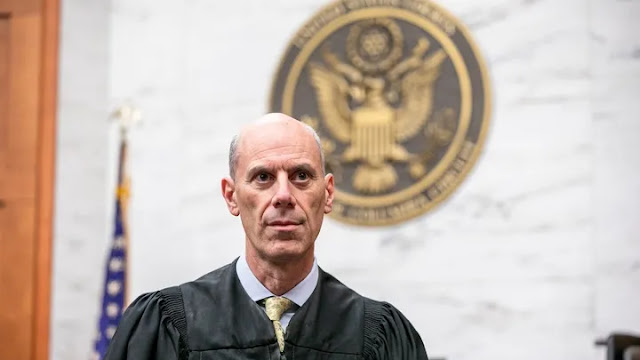Court Orders Planes Back as Justice Department Faces Scrutiny Over Venezuelan Migrants
 |
| U.S. District Court Judge James Boasberg (Getty) - Image from: foxnews |
A tense courtroom showdown unfolded Friday as U.S. District Court Judge James Boasberg sharply questioned Trump administration lawyers about a late-night deportation operation that sent at least 261 migrants, including over 100 Venezuelan nationals, to El Salvador. The move came despite a prior emergency court order halting such deportations under the 1798 Alien Enemies Act for 14 days. Boasberg demanded answers from Deputy Assistant Attorney General Drew Ensign, probing why the administration appeared to defy his ruling and rush the migrants out of the country.
During the hearing, Boasberg pressed Ensign on the timing of the operation, noting that the proclamation authorizing the deportations was signed "in the dark" early Saturday morning, followed by swift plane departures. "To me, the only reason to do that is if you know the problem, and you want to get them out of the country before a suit is filed," the judge remarked. He also reminded Ensign of a previous hearing where, after a 38-minute recess granted for Ensign to gather flight details, the attorney returned claiming ignorance—even as planes were already airborne. "I did not know they were in the air," Ensign insisted, explaining that no one would provide him the information.
Boasberg’s frustration peaked as he issued a Saturday bench ruling ordering the immediate return of any deportation flights carrying Venezuelan nationals targeted under the Alien Enemies Act. He grilled Ensign on how the attorney interpreted that directive, asking, "Did you not understand my statement during that hearing?" The judge has since ordered Trump officials to explain by Tuesday whether they knowingly defied his ruling and why they failed to comply with the recall order.
The legal battle, which may escalate to the Supreme Court, centers on the administration’s use of a wartime-era law to deport Venezuelans, including alleged Tren de Aragua gang members. In a Thursday court order, Boasberg criticized Justice Department lawyers for dodging his questions about the flights, even after he allowed responses under seal, accusing them of "again evaded its obligations." Meanwhile, U.S. Deputy Attorney General Todd Blanche revealed Friday that Cabinet-level talks are underway about invoking the state secrets privilege—a move that could shield details for national security reasons but requires careful deliberation beyond a 24-hour window.
Boasberg acknowledged the administration’s broad immigration enforcement powers but voiced alarm at its apparent disregard for judicial oversight. "The hypotheticals are frightening," he told Ensign, warning that unchecked executive authority could label any minor incident—like a foreign fisherman entering U.S. waters—an "invasion." Ensign deflected, saying, "That’s up to Congress."
Adding to the fray, President Donald Trump took to Truth Social on Friday, urging the Supreme Court to curb federal judges who have blocked over 300 of his executive actions. "STOP NATIONWIDE INJUNCTIONS NOW, BEFORE IT IS TOO LATE," he posted, warning that failure by Chief Justice Roberts and the Court to act would leave the country "in very serious trouble."
As the dispute intensifies, the administration’s next move—potentially invoking state secrets at an appellate hearing next week—could further escalate this clash between judicial and executive power.
